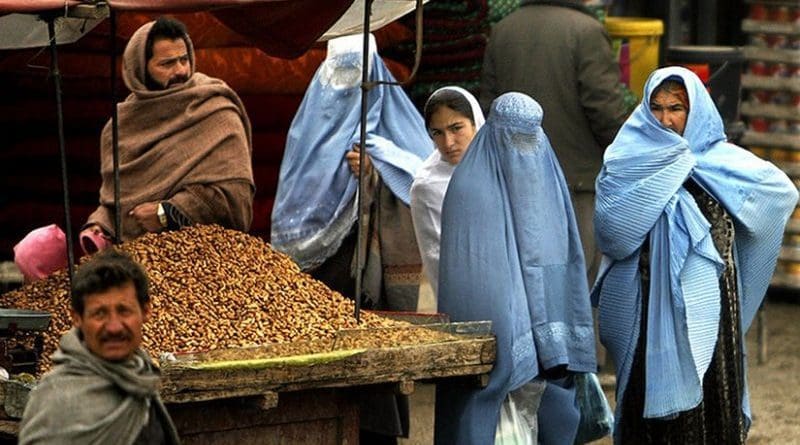Post-American Withdrawal: Afghan Women Beyond The World – OpEd
The video that surfaced on social media on 16 August 2021 where one could see people falling from the landing gears of an airplane that took off to mark an end to US presence in Afghanistan, clearly showed the future of Afghanistan.
The Taliban’s first news conference conducted by Zaibullah Mujahid promised women’s rights, media freedom, and amnesty for government officials, clearly stating that the rights of women will be protected within the framework of Islam.
As soon as the pages turned, the Taliban began establishing their extremist policies according to their interpretation of Islam. Taliban in December 2022, started to forbid Afghan women from working for NGOs and attending universities. They have shut down domestic violence shelters, jailed and arrested female protesters, and limited access for women to public health services. Girls are no longer allowed to attend secondary schools, and the majority of women are not allowed to work, play sports, or travel alone since the Taliban took back power. The situation is even worse in other places and is particularly difficult in backward areas with limited access to the media and digital services, despite the majority of international media coverage focusing on the developments occurring in Kabul. Growing restrictions on Afghan women show how quickly decades-long advancements in women’s rights and gender equality can be reversed.
The only hope left for the women was to seek their prosperity by traveling abroad but the Taliban have now also reacted to the only way left for women. Around 30 ladies who had been sponsored by prominent Emirati businessman Khalaf Ahmad Al Habtoor to study in the UAE were prevented from leaving on their flights on Wednesday morning from Kabul airport. Al Habtoor Group workers spent months making sure everything was ready for the 100 women who had received scholarships in partnership with the University of Dubai. Nevertheless, Afghan authorities stopped their departure without cause, thereby unfairly restricting their freedom.
There is a chorus of outrage and condemnation coming from all around the world on the oppression of women in Afghanistan. Worldwide, governments, organizations, and people have spoken out against any activities that impede the tenacious advancement of women’s rights. In its Human Rights Report, the US Department of State harshly criticizes the situation, stating that “violence and discrimination against women remained significant human rights concerns.”
The protection of women’s rights as stated in the Universal Declaration of Human Rights is crucial, according to the international community, which is motivated by a shared commitment to human rights. Repetition of the European Union’s condemnation: “The European Union reiterates that respect for women’s rights is an essential element of the EU-Afghanistan partnership.” In the meantime, Afghan women are claiming their autonomy and resiliency. Human rights activist Wazhma Frogh from Afghanistan warns us forcefully,
“We won’t go back, not even one step.” There is no limit to what we, as women, can do, says former First Lady Michelle Obama. Criticism demands that both the Taliban and the Afghan government uphold their international commitments and guarantee that Afghan women have the opportunities and rights to which they are entitled. Criticism is not simply a response to repression, but also a call to action.
The commitment of extreme Taliban members may unintentionally be strengthened by criticism from the outside world. The Taliban are opposed to Western influence because they think that their social structure can balance out Western cultural hegemony. External pressure can aid in defending human rights, but a cautious strategy that avoids unintentionally strengthening the resolve of hardliners may be more effective in promoting positive change.
It takes a careful diplomatic strategy to find a smart way to end the oppression of women in Afghanistan while also appeasing the Taliban and the international community. First, meaningful discussion with the Taliban can offer a forum for understanding one another’s viewpoints while underlining the shared objective of a stable Afghanistan. Constructing a bridge between traditional beliefs and modern goals can be achieved simultaneously through fostering conversations with significant religious leaders who support women’s rights within Islamic principles. Open talks concerning the place of women in society would be made possible by the establishment of a National Reconciliation Platform, featuring a variety of Afghan perspectives, and would be woven into the cultural fabric of the country.
To support Afghan women’s access to higher education overseas, it is critical to boost the number of student visas allocated to them. Together, Pakistan and Afghanistan may play a key role by inviting more Afghan women students, promoting educational interaction, and boosting regional unity. Finally, by emphasizing economic incentives and capacity-building programs, women’s education and employment may be established as essential to Afghanistan’s development, demonstrating the practical advantages of women’s empowerment. This multidimensional approach aims to reconcile opposing points of view to pave the way for women’s educational and professional aspirations to grow while honoring Afghanistan’s cultural sensitivities.

